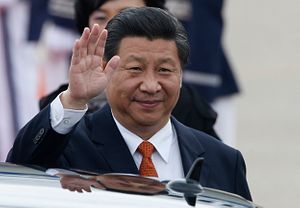For most of Xi Jinping’s tenure as general secretary of the Chinese Communist Party, the general sentiment has been that he is the most powerful Chinese leader since Deng Xiaoping.
There’s a good deal of evidence to support this theory. For one thing, Xi used his charisma to endear himself to the Chinese people in a way that Hu Jintao could only dream of. Over the course of his tenure, this has increasingly morphed into something of a nascent personality cult. Additionally, Xi created myriad new institutions that, at least on paper, increasingly centralize power in his hands. Most notably, of course, Xi is waging an anti-corruption campaign that has been unprecedented in terms of its reach and longevity.
Last week, however, Flashpoints’ newest columnist, Aaron Friedberg, took to these pages to urge caution when making assessments of Xi’s power. “Despite this appearance of solidity, there are some indications that the system may not be as stable as it seems,” he wrote. This seems to have been rather prescient in light of the events of recent days.
In questioning whether Xi is really the “emperor” he is often portrayed as, Friedberg pointed to a number of reports about possible coup and assassination attempts against Xi. These reports are obviously unconfirmed, but they point to an important issue: namely, that the opaqueness of the Communist Party makes assessing the power of its various leaders (among many other issues) insanely difficult. This is especially true when the CCP has every reason to deceive the public on an issue, as is the case with portraying Xi as a strong leader.
In my mind, then, the best way to assess how much power Xi has amassed is by examining how successful he is in rebalancing China’s economy. Xi and Premier Li Keqiang have made it abundantly clear that their first priority is rebalancing the economy away from the current model of relying on state-led investment to fuel growth. In particular, China needs to dramatically increase how much of its GDP comes from household consumption, while decreasing the role of credit expansion and state-led investment.
As I’ve noted before, this will be inherently difficult for Xi to do politically. This is not because it will involve a continued decline in the rate of economic growth, which could fuel mass unrest. In fact, because China needs to increase private consumption, ordinary Chinese should continue to see their lives improve and employment should remain relatively stable even as the growth rate declines (because the service sector is labor intensive).
Rather, rebalancing the economy will be difficult politically for Xi because it will by definition target the livelihoods of members of the Chinese Communist Party. The economic imbalance that Xi needs to correct is caused by the advantages CCP members have enjoyed under the current economic model. Since their lives have been improving faster than the rate of GDP growth during China’s rise (and especially in the recent decade or so), rebalancing the economy will require that their lives improve by less than the rate of growth moving forward. Incidentally, these same CCP members have to implement the policies that will disproportionately harm them. Forcing them to do so, as Xi must, is a daunting task indeed.
There are a number of signs suggesting that he may not be up to it. Over the weekend, China reported new economic data which showed that “China’s factory output grew at the weakest pace in nearly six years in August while growth in other key sectors also cooled.” This has raised new concerns that China will miss its economic target of 7.5 percent growth this year.
Although this prospect has startled investors and markets, it in itself isn’t overly alarming for the purposes of China’s economic rebalancing. In fact, rebalancing the economy necessarily requires slower growth rates, something that the current Chinese leadership has been acknowledging publicly since they took over.
What is important is how Chinese leaders responded to this bleak economic data. In a word: poorly.
Specifically, China’s central bank is reportedly injecting 500 billion yuan ($81 billion) into the top five state-owned banks in the country. This is equivalent to a half point cut in the reserved ratio, something that the Chinese government already authorized over the summer. Beijing has also announced it will begin a new campaign to prop up economic growth by building public infrastructure and housing.
All of this indicates that Xi and the other top CCP leaders are unwilling to tolerate slower growth or the necessary rebalancing of the economy. Since they have acknowledged the importance of doing so on numerous occasions, this unwillingness suggests that they don’t have the power yet to overcome intra-elite resistance.
There are other signs of this as well. For example, a year ago this month China unveiled the Shanghai Free Trade Zone (FTZ) amid much fanfare. However, most of the changes promised at the time have failed to materialize. As the Financial Times reports,“ there has been scant progress on loosening capital controls or liberalizing interest rates in the zone.” Then, this week, it was announced that the informal head of the Shanghai FTZ, Dai Haibo is stepping down.
Thus, appearances aside, Xi Jinping’s continued inability to begin China’s economic rebalance suggests that China’s top leader is still trying to consolidate power. The concern here is, to paraphrase Xi, that the two armies of reform and status-quo are at a stalemate that will continue indefinitely. And that would make Xi Jinping little more than a Hu Jintao in Deng Xiaoping clothing.

































